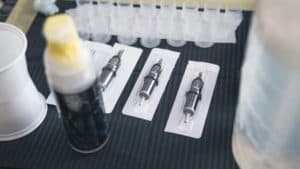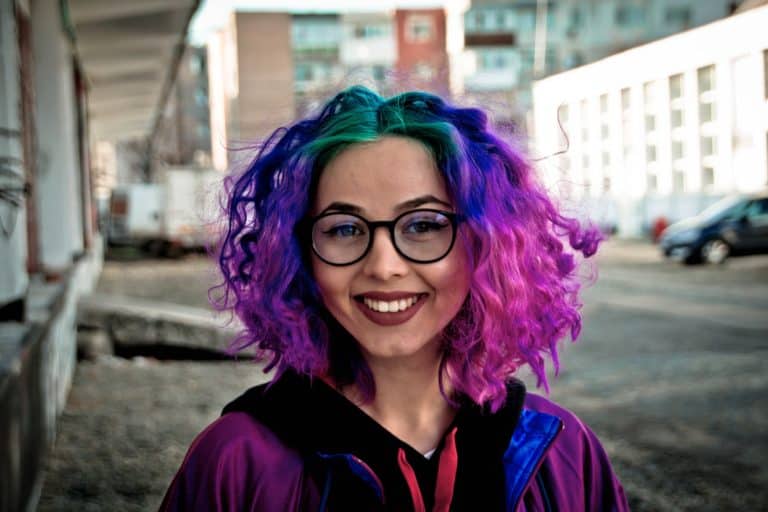Besides clothes and hairstyles, tattoos are a beautiful example of how you can change your appearance. Such body modifications come with a lot of meaning. However, the side-effects of getting a tattoo are what prevent people from getting one in the first place.
Tattoos don’t usually come with many side-effects, but sometimes, the ink might not suit a person. This can become a complicated issue in the future.
According to recent questions, many people wonder if tattoo allergies link to hair dyes, and if people are allergic to tattoos, they want to know if they’re allergic to hair dye as well.
This can vary from person to person, depending on how well your body accepts the ink. If the tattoo ink agrees with your body, it’s not necessary that your hair dye will, too. This is because some of the ingredients that go into making these substances are different.
But at the same time, it is not entirely impossible as both tattoo ink, and hair dye contains a similar substance known as PPD. This substance may cause a cross-effect on the body when mixed together as the PPD levels become more oxidized.
You’ll have to consider many things before making a decision as to whether tattoo make you allergic to hair dye. Read further down to learn more about this.
Can I Get a Tattoo If I’m Allergic to Hair Dye?
No, it is not necessary that you are allergic to hair dye just because you had an allergic reaction to tattoo ink. For hair dye to work effectively, the formula requires mixing with hydrogen peroxide,

As your body registers something harmful entering the body, your immune system starts to pump up and works at an incredibly fast speed by not accepting any ink to stay in your body. Many people perceive this as an allergic reaction, but it’s not that in most cases.
Some people are very sensitive towards ink, and it would be best if they avoid getting a tattoo, which is the sad truth.
This could mean that you can still get your hair dyed, and hair dye doesn’t get directly injected into the dermis. If you want to test if you’re allergic to tattoo ink, discuss this with a professional tattoo artist.
They will inject a dot of ink to see if you’re allergic to it. This is the right way to know, especially if you have experienced allergic reactions to hair dye before.
Your hair dye may not be of high-quality formulas and may consist of poor toxic ingredients that might have caused the allergic reaction. If you go to a professional tattoo parlor, you won’t have to worry about getting the wrong ink injected into your body. Professional parlors are very strict when it comes to quality and hygiene.
Is Hair Dye and Tattoo Ink The Same?
Nowadays, we often take product safety for granted, which explains why we often don’t bother checking the ingredients mentioned behind a drugstore hair dye box. This is potentially dangerous as you must always be aware of the chemicals and components that go into these products.
The same goes for ink tattoos, but customers usually don’t get the box in hand.
Hence, you should ask your tattoo artist. You will only go through these things if you’re worried about having an allergic reaction to one of these substances, especially if you’ve been allergic to one before.
Hair dye and tattoo ink are completely two different substances that consist of different ingredients and formulas. However, one ingredient that is the same in both products and is PPD.
As mentioned earlier, PPD can induce an allergic reaction, especially when you experience a cross-effect due to twice the amount of PPD on your body. Many people tend to use tattoo ink as a hair dye, but this is very risky, especially for those who are already prone to allergies.
While hair dye and tattoo ink are two different things, there is a slight chance that the ingredient PPD may cause a crossed-effect in some, especially if you apply higher amounts of both hair dye and tattoo ink.
Again, it is best to consult your doctor and tattoo artist to assess the possible complications that could occur. In the end, while both products offer coloring properties, it is absolutely certain that hair dye and tattoo ink are definitely not the same.
Why Do Tattoos Increase Risk Of Allergic Reaction To Hair Dye?
In some cases, there is a possibility that you may become allergic to hair dye if you have a tattoo, or there are more risks to having an allergic reaction. One of the main reasons for this to be possible is the level of PPD in both products.
Tattoos, especially black henna, include higher levels of PPD compared to hair dye. This substance can get easily triggers when your body receives more contact with PPD.
So if you already have a tattoo and somewhat may have faced minor allergic reactions for a while, the tattoo ink will trigger the same effect with hair dye, causing a major allergic reaction.
According to reports in the British Medical Journal, these reactions are becoming more and more common, especially in people who already have very sensitive skin. Most of these allergic reactions appear on the face, and it starts to swell up with minor bruising that gets quite painful within time.
This is why many dye boxes say that your tattoo may increase the risk of allergy, which you can find on the box of your hair dye. This comes under important safety warnings.
The allergic reaction might not happen instantly after applying hair dye with a tattoo on, but it could pop up at any time once the chemicals start combining.
Common Symptoms of a Tattoo and Hair Dye Allergy
If you’re having an allergic reaction to hair dye because of your tattoos, then you’re most likely to experience symptoms that may take at least 48 hours or less to show up. These symptoms occur differently in each person and in varying intensity.
Some of the most common symptoms involve blisters, red rashes all over the body, constant itching or swelling on the face and scalp, and burning sensations.
You may also notice persistent swelling on the feet, lips, and hands. In some cases, the symptoms may become very intense, especially if the allergic reaction causes anaphylaxis.
These symptoms involve vomiting, nausea, difficulty in breathing, swollen tongue, swollen throat, and fainting. If your symptoms don’t subside in a few hours, especially if you have an anaphylactic reaction, you must visit the nearest healthcare emergency.
How to Treat the Allergic Reaction Caused by Tattoos and Hair Dye?
It’s important to seek treatment if your symptoms become very intense, but in most cases, you can treat them at home if they are mild and don’t occur for a long time. If you notice swelling in your scalp or a burning sensation, then the first thing you must do is use a shampoo that contains corticosteroids, as this helps relieve any burning sensation on the scalp.
Shampoos such as Colbex include this ingredient. You can also use an antiseptic such as hydrogen peroxide and apply it all over the skin to achieve a calming effect from the inflammation and blistering caused on your skin or scalp.
Some people may notice an instant allergic reaction after applying little amounts of dye to the hair. The moments you feel like the dye isn’t agreeing with you as one rinse off the hair product with warm water and apply mild soap or shampoo to get rid of it thoroughly.
An instant shower is the best way to prevent the symptoms from worsening; however, some people might not notice the allergic reaction at once. You can also use a solution of potassium permanganate and apply it to the affected areas. This solution helps oxidize PPD and works especially when you have a tattoo on it.
Lastly, you can switch to medications such as anti-allergies. The best one to take for an allergic reaction such as this would be Benadryl, which can reduce itchiness and skin inflammation.
The Bottom-Line
Knowing that you could have an allergic reaction if you use hair dye while having a tattoo is daunting as it sounds. But this shouldn’t scare you for good as everyone is different, and it’s not necessary that you attain an allergic reaction from tattoos and hair dye just because the person next to you gets one.
The best way to determine if you’re allergic to hair dye while having tattoos is by testing a bit of it or taking an allergy test and consult your doctor.

